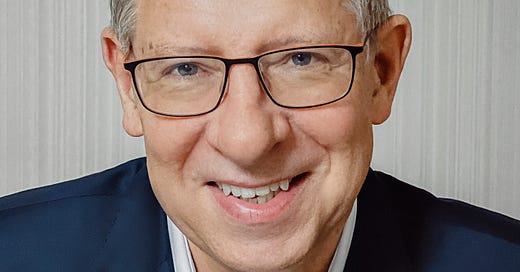Robert Baker on unlocking the power of DEI, insights on initiating change and the vital role of male allies.
Robert Baker is the Founder and CEO of Potentia Talent Consulting and is a passionate advocate for diversity, equity and inclusion (DEI). After a 40 year career in global HR consulting, he now runs his own business, advising organisations on attracting, retaining and developing the best talent and building diverse teams. Robert is a Board member of European Women on Boards and is their D&I strategist. He is also a Trustee of One Loud Voice for Women and a visiting lecturer on Male Allyship at the University of Amsterdam Academy.
Dinal: The diversity and inclusion space is highly impacted by external events. As a result and throughout your experiences, what have been some of the big shifts you've seen and how has the response been from the corporate world?
Robert: The organisations we work in are a major part of society and are therefore deeply impacted by external events. How leaders in the corporate world react and deal with these events is therefore critical to the work experience of their employees and can make a big difference in their lives.
There have been many notable external events over the years which have had a huge impact on companies. These events have had vastly differing impacts on different sections of society, depending on our access to economic means, healthcare and education. Key recent events which I have lived through are the #BlackLivesMatter Movement, accelerated by the George Floyd protests in 2020: the #MeToo Movement: the COVID-19 pandemic and the recent campaigns for climate justice. These events have needed a response from companies as they have deeply affected their employees and their families.
“How leaders in the corporate world react and deal with these events is therefore critical to the work experience of their employees and can make a big difference in their lives.”
In general, the reaction from the corporate world however has been mixed and often tactical and opportunistic in nature. For example, we saw many companies accelerate their DEI efforts, especially in the USA, following the protests over the murder of George Floyd. However many of these efforts are now being reduced or discontinued and the DEI leadership roles that were created are being unwound. We also see much talk but less action from companies and their leaders on major issues like climate change, but many companies truly are “green washing” with their responses. A key event playing out now is the post COVID response to hybrid working and how companies are accommodating the needs of underrepresented groups in their workforce.
There are some shining examples of individual leaders and companies that have used these external events to reshape company policies and closely review the impact on their employees, but there is clearly more the corporate world can do to show that People and the Planet matter just as much as Profit!
Dinal: Many organizations are at the very start of their DEI journey, what is the first step they should take?
Robert: Organisations that want to build a more diverse, equitable and inclusive environment need to work on three key areas: leaders, culture and the HR systems and processes that support the company. They also need to develop their communications and employee value proposition around their stance on DEI.
However, progress will not really ignite, nor be sustained, unless the leadership of the organisation is engaged on the need for change. Corporate leaders decide the priorities, budgets and put people in key roles to achieve their business goals. They need to identify the actions they can take to advance DEI in the company in support of these business goals and they need to hold themselves accountable for progress. However the key first step for these leaders is to articulate their vision, purpose and mission: in essence their WHY: why DEI is so important to them personally as well as to the organisation. In the workshops I run, we get the leaders to develop their “elevator pitch” to convince their immediate reports and the wider workforce of the imperative for progress in DEI and the need for change. But we emphasise that their pitch needs to be personal and authentic – leaders that truly believe in the power of DEI are vital if the company is going to be successful in driving change!
Dinal: You've often emphasized the need for male allyship throughout your work, why is this important and what's a tangible way men can take action?
Robert: Men are some 80% of leaders globally and over 60% of line managers, so they have a huge potential to create a more diverse, equitable and inclusive organisation. Indeed a BCG study showed that where men were engaged in gender equality, 96% of companies report progress, whereas only 30% showed progress where men were not involved.
“The key first step for leaders is to articulate their vision, purpose and mission: in essence their WHY: why DEI is so important to them personally as well as to the organisation.”
Given this data, there is a huge focus in the corporate world right now on men stepping up as allies to women in the workplace. There is a large difference between the actions that male leaders and individual contributors can take and a big difference in the impact that they can have. However one of the most tangible ways men at all levels can take action is for them to take an interest in the lived and work experiences of their female colleagues. I find that many men are simply not aware of the microaggressions and harassment that women face on a daily basis in the workplace. So taking time to actively listen to their female colleagues and then reflect on their own behaviours is an excellent starting point for most men.





